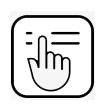
Dialectical Behavior Therapy focuses on problem-solving and acceptance-based strategies.
Substance abuse
Borderline personality disorder
Suicidal behavior
Acute emotional distress
Extreme sensitivity to rejections
Chronic & Severe mental illness

Core Mindfulness
Living in the moment is made more accessible by mindfulness practice. The practice assists you in developing a nonjudgmental awareness of what is happening inside of you (your thoughts, impulses, feelings, and sensations) and what is happening outside you (what you hear, see, touch, and smell).

Distress Tolerance
When you practice accepting change, you develop the skill of distress tolerance. Focusing on a few tactics can gradually help you learn how to handle the situation more effectively.

Emotion Regulation
You can deal with intense emotions effectively with the right skills and support. The skills that will help you:

Interpersonal Effectiveness
Interpersonal Effectiveness focuses on how you'll connect with others in your life positively. You may learn how to deal with potentially stressful circumstances and interpersonal interactions.
Get Support NowOur experienced therapists aim to support and guide you when dealing with acute mental health issues.


855-722-4422

Change your thoughts and you change your world

Norman Vincent Peale
Our DBT program's primary goal is to strike a balance between accepting who you are and moving towards positive changes.

Find Your Therapists

Check Your Insurance

Schedule Your Initial Session

Identify challenges with the help of experienced therapists and work towards improving the quality of your life. Remember, any progress is good progress.
Connect with your DBT therapists from the comfort of your home, and talk about your innermost feelings with utmost ease through online dialectical behavior therapy sessions.
Ready for My session
Our Therapists | Insurance | Services Offered | Privacy
At Lifebulb, we understand the importance of affordable access to therapy. That's why we accept major commercial insurance plans for DBT therapy. We proudly work with Blue Cross Blue Shield, Aetna, Cigna, United Healthcare, Tricare, and Medicare. If you don't see your insurance listed, not to worry. We're here to help. Our team will gladly verify your benefits to see if we can accept them. And if your insurance isn't in our network, we offer an affordable self-pay rate, so you can still receive the care you need. Your well-being is our priority, and we're committed to finding the best solution for you.
At Lifebulb, we understand that seeking therapy shouldn't be a financial burden. That's why we prioritize providing the best online DBT therapy experience without any ongoing membership or fees. We believe that everyone deserves access to high-quality therapy without any additional out-of-pocket expenses. When you choose Lifebulb, the only costs you'll encounter for your DBT therapy sessions are the ones established by your insurance provider or our affordable self-pay rate. Our goal is to make therapy accessible and affordable, so you can focus on your healing journey. With Lifebulb, you can receive the support you need without worrying about ongoing fees.
At Lifebulb, we understand the financial concerns that can come with seeking therapy. Unlike many other practices that only accept self-pay clients or out-of-network benefits, we strive to make therapy more accessible and affordable. That's why we accept most major insurance plans, helping to keep your costs low. In fact, for online dialectical behavior therapy sessions, the out-of-pocket expense is often just a low copay, usually between $30-$50, determined by your specific insurance provider and plan. We want to ensure that cost is not a barrier to getting the help you need.
We also understand that not everyone has insurance or may prefer not to use their healthcare benefits for therapy. That's why we offer a self-pay rate that is lower than what many other practices charge. Whether you have insurance or not, we want to make therapy accessible to all.
At Lifebulb, we deeply value the importance of finding the right therapist to guide you towards achieving your dialectical behavior therapy goals. We believe that the client-therapist relationship is a crucial factor in the success of therapy. However, we understand that not every DBT personality disorder specialist may be the perfect fit for every client. Your satisfaction and comfort are our top priorities.
If your dialectical behavior therapy experience is not meeting your expectations or you feel that a different therapist would better suit your needs, we are here to help. Our dedicated team will work closely with you to ensure that you are set up to see someone you prefer. We want you to have a positive and productive therapy journey, so if adjustments need to be made, we are committed to making them.
At Lifebulb, our mission is to provide the highest level of care and support to help you live your brightest life. We understand that finding the right therapist is a critical part of that journey, and we are here to facilitate that process. Don't hesitate to let us know if you would like to explore different options. Your well-being and satisfaction are important to us, and we are here to empower you every step of the way.
At Lifebulb, we prioritize the protection of your privacy. We understand the importance of safeguarding your personal information and adhere to the guidelines set out by HIPAA. As a covered entity under HIPAA regulations, we are committed to fully complying with all HIPAA rules and regulations.
If you have any inquiries or suggestions regarding our privacy and security practices, we are here to assist you. Please feel free to reach out to us at privacy@lifebulb.com. We value your trust and are dedicated to ensuring the confidentiality of your information.
We believe that when therapists are truly passionate about their work and feel fulfilled in their workplace, they are able to offer the highest level of counseling and dialectical behavior therapy. By creating an environment where therapists can truly enjoy their work and feel supported, we ensure that they can bring their passion and expertise into each session with you.
We believe that a strong client-therapist relationship is the foundation for effective therapy. By prioritizing the happiness and fulfillment of our therapists, we are able to foster an atmosphere where they can thrive and provide you with the utmost care and support. At Lifebulb, we are committed to connecting you with the best therapist who not only excels in their field but also deeply enjoys their work in session with you, where they work, and who they work with.
Your well-being is our priority, and we believe that by prioritizing the happiness of our therapists, we can offer you the highest standard of care. Together, we can embark on a journey towards a brighter and more fulfilling life.
Our online dialectical behavior therapy sessions are conducted by our highly qualified therapists in private spaces. We prioritize your confidentiality and ensure that your face, voice, and data are always kept private and protected. To safeguard your privacy, we utilize a secure video platform that is contained within our HIPAA-compliant Electronic Health Records system. This means that your personal information is stored and transmitted in a secure and encrypted manner, in accordance with HIPAA regulations.
Lifebulb is considered a covered entity under HIPAA guidelines, which means we are subject to all HIPAA rules and regulations. If you have any questions (or recommendations) about our privacy and security practices, we want to help. Contact us at privacy@lifebulb.com.
Our therapists are at the heart of what sets us apart. Unlike many practices that prioritize growth over the well-being of their staff, we value the growth and fulfillment of our therapists. We have discovered that Dialectical Behavioral Thearpists who genuinely enjoy their workplace are able to provide the most effective treatment. That's why our primary focus at Lifebulb is creating an environment that supports and nurtures our therapists. By doing so, we believe our clients are in the best position to achieve their goals in dialectical behavior therapy, whether through in-person counseling or virtual therapy for DBT near you.
At Lifebulb, we are dedicated to helping you live your brightest life. We recognize that a strong client-therapist relationship is crucial to the success of therapy, and we are committed to connecting you with the best therapist for your unique needs and goals. Our highly educated, experienced, and passionate therapists are the foundation of our mission. Together, we can embark on a journey towards greater well-being and a brighter future.
At Lifebulb, we understand the importance of finding the right therapist to support you on your journey towards achieving your goals. That's why we are meticulous in selecting our therapists, ensuring that they possess the expertise and qualities necessary to make a meaningful difference in your life. Our dialectical behavior therapists have undergone extensive education and training at the master's level and beyond, and have accumulated years of practical experience before becoming licensed clinicians. What sets our therapists apart is not just their high level of training, but also their unwavering commitment to our core values. This ensures that your DBT therapist will go above and beyond to provide you with the best possible DBT treatment, whether it be through online sessions or in-person counseling. At Lifebulb, we are dedicated to helping you live your brightest life.
Lifebulb’s dialectical behavior has several locations for in-person counseling and adds more regularly. We also provide telehealth or online dialectical behavior therapy near me session services for those far from our offices.
All our counselors are highly educated and trained and have received their full clinical licensure from practicing counseling. We also thoroughly interview each of our therapists, ensure they pass a background check, and train them in-house to work with us. Additionally, we ensure that each of our counselors and dbt personality disorder specialists participates in ongoing education to continue to provide the best in-person and online DBT therapy near me services possible.
Our clients must work with the best possible fit as DBT personality disorder therapist for their specific treatments for dialectical behavior therapy. This is why we provide detailed bios of our therapists for our clients to review before contacting us. If you have a specific DBT personality disorder specialist in mind to work with, we would be happy to schedule you to see them. We also understand that our clients don't always match perfectly with their therapist, and in the case of a less-than-great fit, we will help you to find the right match among our team and, if necessary, provide the best referral we can to someone more suited to help you beyond our walls.
We employ licensed clinical psychologists, as psychologists can offer services, such as the best online dialectical behavior therapy services and psychological testing, that many other license types cannot offer. Often, your counselor or DBT personality disorder specialist can work with a psychologist to provide therapy and psychological testing when necessary to better provide for your specific needs or goals. In this way, we are able to better provide for a broader range of your needs.
A professional counselor is a master- or PhD-level mental health professional approved by a state licensure board to diagnose and treat mental health disorders. The exact name of a professional counselor's license can vary by state, but some of the most common are Licensed Mental Health Counselor (LMHC), Licensed Professional Counselor (LPC), Licensed Clinical Professional Counselor (LCPC), and Licensed Professional Clinical Counselor (LPCC).
Contrary to popular assumption, dialectical behavimor therapy or DBT treatment involves only four major techniques rather than the six that most people think it involves. And those four main strategies are:
Mindfulness - Being mindful is a crucial ability. A person who experiences this emotion learns to live in the moment, feel life as it is, and stop living years in the future. A patient will not be taught any other skill sets in DBT therapy sessions unless they have a firm grip on how to be a mindful person. This particular skill is regarded as the foundation of DBT therapy.
Interpersonal Efficiency- By interpersonal efficiency skills you will learn how to connect with those around you, your own relationships, and the difficulties that might make life unpleasant.When you disagree with anything or refuse a request, you will know how to say it politely and without resentment once you grab hold on this skill set.
Emotion Control- The ability to control your emotions when you are an intense person can be challenging, but with the correct support, you can accomplish anything. DBT treatment on emotion control is ideal for people who frequently experience strong emotions including anger, despair, anxiety, and depression.
Tolerance for distress- An individual will learn the art of acceptance and change throughout the distress tolerance session.
In an effort to treat personality problems and interpersonal difficulties, dialectical behavior therapy was developed. It is basically a type of talk therapy that is also closely based on cognitive behavioral therapy(CBT). DBT therapy may be helpful for treating mood disorders, suicidal thoughts, and for altering behaviour patterns including self-harm and substance abuse, according to the evidence.
The ultimate purpose of DBT therapy is to help you in recognizing and accepting your challenging emotions
In DBT therapy or dialectical behavior therapy sessions , clients and therapists work through their relationship issues. Patients perform role-playing exercises, complete homework, and work on coping mechanisms. The patient and therapist work closely together to accomplish all of this.
People who have trouble controlling and regulating their emotions benefit greatly from dialectical behavior therapy (DBT). DBT therapy has demonstrated efficacy in the management of a variety of mental health issues, including: Borderline personality disorder (BPD).
Dialectical behavior therapy (DBT) typically lasts between six and twelve months. However, because each person is different and because mental health issues are complicated, After a year of DBT, you shouldn't anticipate being totally free of symptoms or having troublesome behaviors.
At Lifebulb, our specialist therapists and counselors are dedicated to providing personalized in-person or online therapy to help with a wide range of mental health concerns, including anxiety, depression, grief and loss, trauma, PTSD, couples and marriage counseling, life transitions, adjustment disorders, bipolar, schizophrenia, eating disorders, child counseling, teen and adolescent therapy, anger management, career coaching, life coaching, ADHD treatment, family therapy, panic or dialectical behavior attack, phobias, substance abuse, virtual therapy, online counseling, EMDR, EFT, and many more. We understand that seeking help for mental health issues can be overwhelming, and that's why we offer a supportive, empathetic, and informative environment where our therapists work collaboratively with you to develop holistic treatment plans tailored to your individual needs and goals. Our mission is to help you live your brightest life by providing practical solutions and hope for a better future.
Your initial session with a Lifebulb DBT personality disorder specialist or counselor will be different from a typical information-gathering session about your background and demographics. We understand that taking the brave step to seek help can be both significant and challenging. At Lifebulb, our first offline or online dialectical behavior therapy session is dedicated to offering the specific support and service you're looking for. Our goal is to demonstrate that therapy can be effective when both you and the therapist are committed and put in the effort. We're here to guide you along this journey towards healing and growth, providing practical solutions and fostering a strong partnership between you and your therapist. Remember, you have the power to live your brightest life, and we're here to support you every step of the way.
We believe accessing a DBT personality disorder specialist or counselor should be quick and easy. So our process is straightforward. Simply browse our therapists' bios to find the right fit for you and schedule a virtual counseling or in-person counseling session online. Or call our office, and a team member can help ensure you're matched with the right DBT personality disorder specialist or counselor for you and your goals. Whether online DBT individual therapy or offline therapy, your therapist will help you with an individualized DBT treatment plan to help you reach your specific goals
If you are facing an emergency at this moment, please call 911 right away. While Lifebulb is not a crisis center and our DBT personality disorder specialists and counselors are not emergency services, we understand that urgent situations can arise unexpectedly. You will have direct access to your therapist or DBT programs through email and phone, and they will do their utmost to be there for you when you reach out. Depending on your individual DBT treatment plan, your DBT personality disorder specialist may offer you resources to utilize or connections to reach out to in case of situations that go beyond the scope of our therapy sessions together. Remember, at Lifebulb, we are here to support you through every step of your journey towards healing and recovery. Your well-being is our top priority as we work together to help you live your brightest life.
At Lifebulb, we understand that taking the step to book a therapy session can be daunting, and that's why we're here to support you every step of the way. Once you've scheduled your appointment with your therapist or counselor, our team will promptly send you an email confirmation with all the details about your appointment, including a link to the virtual dialectical behavior therapy room. You can simply click on the link and log in a few minutes before your session, and your DBT personality disorder specialists will be there to greet you. We know that starting therapy may bring up a range of feelings, and we want to reassure you that our team is here to offer a safe and supportive virtual space where you can feel comfortable, heard, and empowered to seek positive change.
Yes. All of our therapists are able to provide the best online dialectical behavior therapy and dbt individual therapy services to our clients.
At Lifebulb, we prioritize your privacy and convenience by utilizing a HIPAA-compliant video counseling service integrated into our Electronic Health Records System for seamless online DBT behavioral therapy sessions. Scheduling a session with us is straightforward and stress-free. Just reach out by calling our office or requesting a preferred session time on our website, and a compassionate team member will assist you in booking with the most suitable DBT personality disorder specialist or confirming your virtual session details. We'll take care of reviewing your insurance information and going over a few simple policies before emailing you a confirmation of your session date and time, whether it's for in-person or virtual therapy. Our goal is to make the process easy and comfortable for you, so you can focus on taking positive steps towards healing and brighter days ahead.
Booking a session with us is quick and straightforward, with several options to choose from. You can reach out to our office and speak with a caring team member who can assist you in finding the best possible fit for a therapist. We'll take care of reviewing your insurance information and going over a few simple policies before sending you an email confirmation of your session date and time, whether it's for an in-person or virtual appointment. Alternatively, you can browse our website and select your ideal DBT personality disorder specialist, then schedule a session time that works best for you. Rest assured, we'll be in touch to confirm all of your appointment details. At Lifebulb, we are committed to connecting our clients with the best possible therapist for their unique needs and goals, ensuring that they receive the personalized care and support necessary to help them on their path towards brighter days ahead.
At Lifebulb, we understand that unexpected circumstances may arise that require you to cancel or reschedule your online DBT behavioral therapy session. We want to make the process as easy and flexible as possible for you. If you need to make any changes to your appointment, simply reach out to our office or contact your counselor or DBT personality disorder specialist at least 24 hours in advance. By doing so, you can cancel or reschedule your session without incurring any costs. We believe that your well-being and comfort are of utmost importance, and our flexible cancellation policy reflects that commitment. We want to ensure that you have the flexibility and support you need to prioritize your mental health.
At Lifebulb, we understand that DBT personality disorder treatment is a journey that often takes time and commitment. However, we want you to know that taking those steps toward therapy can lead to significant improvements in your overall mental health. Research has shown that therapy has the power to enhance feelings and behaviors, and it can even have positive effects on the brain and body. While there is no guaranteed "cure" for personality disorders, therapy can help facilitate positive lifestyle changes that can make a real difference in your life. We believe in the power of therapy to offer hope, support, and the possibility of a brighter future. If you're ready to take that courageous first step, we encourage you to reach out and explore how our passionate and highly skilled therapists can guide you toward a path of healing and personal growth. Remember, at Lifebulb, we are here to help you live your brightest life.
We have a flexible DBT behavioral therapy cancellation policy. Call our office or contact your counselor 24 hours or more before your session time to cancel or reschedule an in-person or virtual therapy appointment.
Read to learn more about dialectical behavior therapy and how it may help your mental health.